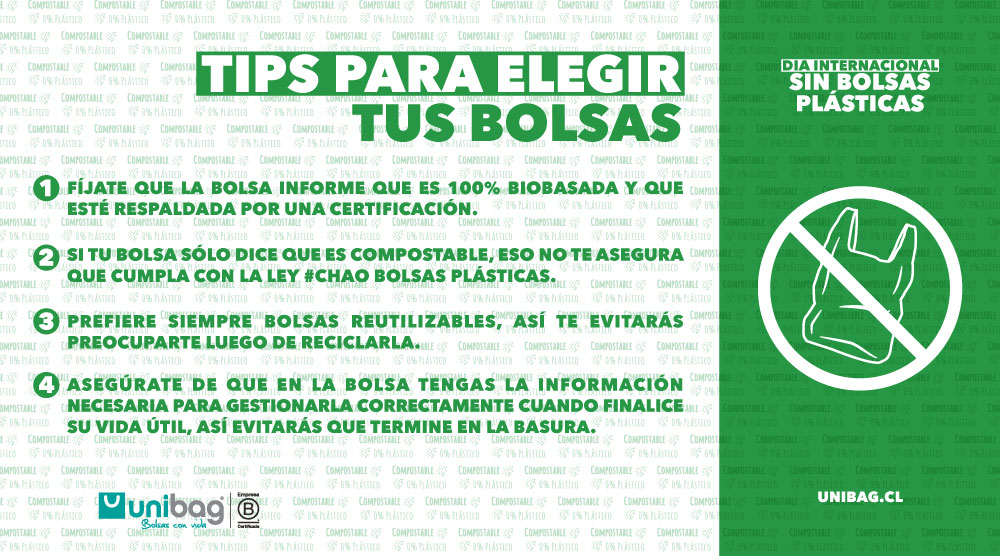Plastic bags are still sold in Chile
July 3 International Plastic Bag Free Day
International Plastic Bag Free Day was established to raise awareness of the negative impact of plastic bags on the environment and to promote more sustainable alternatives. These bags are a serious problem because they are single-use and easily discarded.
In Chile, despite a law that prohibits them, plastic bags are still used in commerce.
The specific date of July 3 is not related to a historical event or a particular reason, but was chosen to highlight the need to address this global problem. It is a reminder for individuals, organizations and governments to take action to reduce the consumption of plastic bags and encourage their replacement with more environmentally friendly options, such as bio-based reusable bags.
In Chile, according to data from the Ministry of the Environment, 95% of citizens agree with banning plastic bags. There are several reasons for the need to ban or regulate the use of plastic bags:
- Environmental impact: Plastic bags have a significant impact on the environment. They are single-use and are usually discarded after a short period of use. As a result, millions of tons of plastic bags end up in landfills or are dispersed in the oceans and other natural ecosystems. These bags can take hundreds of years to degrade, which means they remain in the environment for a long time, causing pollution and damage to wildlife.
- Water and soil contamination: Plastic bags, when broken down into smaller fragments, can contaminate water bodies and soils. These plastic fragments, known as microplastics, are ingested by marine life and land animals, which can have serious consequences for their health and the food chain in general.
- Threat to wildlife: Many animals, such as birds, fish and marine mammals, mistake plastic bags for food and ingest them, which can cause suffocation, blockage of the digestive system and death. In addition, animals can become trapped in the bags, making it difficult for them to move and survive.
- Excessive consumption of resources: Mass production of plastic bags requires large amounts of oil and energy. By banning plastic bags, we can reduce the consumption of these non-renewable resources and reduce the carbon footprint associated with their production and disposal.
- Promoting sustainable alternatives: Banning plastic bags encourages the use of more sustainable alternatives, such as reusable bio-based vegetable bags. These bags are less harmful to the environment as they can be used several times before disposal.
The banning of plastic bags is an important measure to address the problem of plastic pollution and to encourage more responsible and sustainable practices in relation to consumption and waste management. By promoting changes in consumption habits and encouraging the adoption of more environmentally friendly alternatives, we can significantly reduce the negative impact of plastic bags on our planet.
In Chile, since 2018 there has been law 21,100 known as the Chao Plastic Bags law, which prohibits the delivery and sale of plastic bags to commercial establishments. This law includes in the ban single-use plastic bags, reusable bags, biodegradable bags and bags used for e-commerce dispatches, as long as they contain petroleum-derived plastic in their composition. Bags or packaging used as primary packaging for food, fruits and vegetables are not included in this law.
According to estimates by the Chilean Ministry of the Environment, before the implementation of the law, approximately 3.4 billion plastic bags were consumed annually in the country. The implementation of the law has had a significant impact on the reduction of plastic bag consumption in the country. In the first year of implementation of the law (2019), it is estimated that almost 65% of the plastic bags in use were discontinued, according to MMA.
The bags that have emerged as an ideal substitute for plastic bags in Chile are:
-
Reusable vegetable bags. They are reusable bags made of a polymer called PLA (Polylactic acid), derived from corn starch that does not contain any petroleum derivatives in its composition, so they are 100% bio-based and compostable.
-
Cotton bags. These cloth bags are allowed when they are made of 100% cotton. However, it is not uncommon to see balls containing cotton/polyester blends on the market.
-
Paper bags. These bags are widely used by supermarkets for home delivery and by all stores, due to their low price, but they do not solve the problem of changing the habit of reuse and do not prevent waste generation.
However, although there are several options of bags that can be used, today there is great confusion in the market and plastic bags that are prohibited by law are still being used, such as:
-
Compostable or biodegradable single-use plastic bags: These bags are mostly made of a polymer called PBAT, which is derived from petroleum, although it is compostable.
-
Reusable plastic bags derived from sugar cane: These bags contain a percentage of petroleum-derived plastic and do not solve the problem of plastic pollution because they take 400 years to degrade and weigh 7 times more than the single-use plastic bags they replace.
-
TNT or laminated polypropylene bags: These reusable bags are made from petroleum-derived polymers and are prohibited when used in a retail establishment.
-
Compostable or biodegradable e-commerce bags: Like compostable single-use plastic bags, these bags made mostly from PBAT polymer are derived from petroleum, although they are compostable.
According to Eliana Moreno, co-founder of Unibag, Chile’s leading manufacturer of reusable bags, “The use of plastic bags prohibited by law is mainly due to two reasons: 1) the lack of knowledge on the part of users and companies of the full scope of the “no plastic bags” law and 2) the lack of control by the municipalities, who are in charge of applying the law in specific cases”.
On the other hand, there is a real lack of recycling of the plastic bags currently in use. According to the latest report published by ANIR (National Association of the Recycling Industry) on polyethylene (PE, the main material used in plastic bags), by 2021 only 27% of plastic bags will actually be recycled and 73% will end up in landfills or polluting the environment. In 2018, the amount of bags available for recycling in Chile fell by 18% thanks to the “chao bolsas” law, but in 2021 it increased by 14% as a result of the import of packaging bags and reusable polyethylene bags (bags derived from sugar cane).
This July 3, International Day without plastic bags, is a day to reflect on the consumption of plastic bags in our country and the serious consequences this has for our environment, despite the fact that Chile has a law that prohibits them.
This post is also available in: Spanish






Leave a Reply
Want to join the discussion?Feel free to contribute!